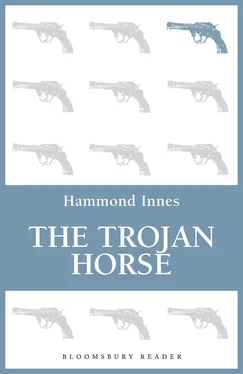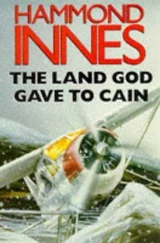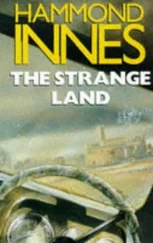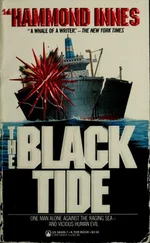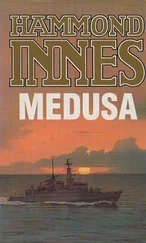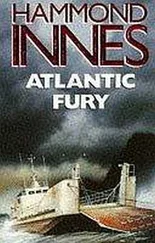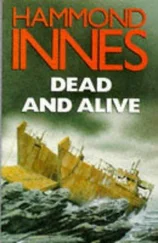Hammond Innes - The Trojan Horse
Здесь есть возможность читать онлайн «Hammond Innes - The Trojan Horse» весь текст электронной книги совершенно бесплатно (целиком полную версию без сокращений). В некоторых случаях можно слушать аудио, скачать через торрент в формате fb2 и присутствует краткое содержание. Жанр: Прочие приключения, на английском языке. Описание произведения, (предисловие) а так же отзывы посетителей доступны на портале библиотеки ЛибКат.
- Название:The Trojan Horse
- Автор:
- Жанр:
- Год:неизвестен
- ISBN:нет данных
- Рейтинг книги:4 / 5. Голосов: 1
-
Избранное:Добавить в избранное
- Отзывы:
-
Ваша оценка:
- 80
- 1
- 2
- 3
- 4
- 5
The Trojan Horse: краткое содержание, описание и аннотация
Предлагаем к чтению аннотацию, описание, краткое содержание или предисловие (зависит от того, что написал сам автор книги «The Trojan Horse»). Если вы не нашли необходимую информацию о книге — напишите в комментариях, мы постараемся отыскать её.
The Trojan Horse — читать онлайн бесплатно полную книгу (весь текст) целиком
Ниже представлен текст книги, разбитый по страницам. Система сохранения места последней прочитанной страницы, позволяет с удобством читать онлайн бесплатно книгу «The Trojan Horse», без необходимости каждый раз заново искать на чём Вы остановились. Поставьте закладку, и сможете в любой момент перейти на страницу, на которой закончили чтение.
Интервал:
Закладка:
I turned to David. ‘This isn’t my book,’ I said.
‘Don’t be silly,’ he replied. ‘It’s got The Face from the Barbican at the top of every page.’
‘Yes, but it’s not my copy.’ I explained about the pencil marking and showed him the passage.
‘Are you certain?’ he asked. ‘You were awfully sleepy last night.’
‘Yes, I’m certain all right,’ I said. ‘This isn’t my copy. And that bottle of hydrochloric wasn’t tipped over by the cat. Where did you put the negatives when you went to bed?’ I asked him.
He frowned. ‘I don’t know,’ he said. ‘Where I found them this morning, I think.’
‘And what about the hydrochloric — was that just beside them?’
He shook his head. ‘Honestly, old boy, I don’t know.’ He went to the door of the dark-room. ‘Miriam,’ he said, ‘can you remember whether that bottle of hydrochloric was on the table there last night?’
‘I don’t know,’ she replied. ‘Depends on whether you used it after I’d gone yesterday. I tidied up as usual and left it on the shelf over there, where it belongs.’
‘And I didn’t have it out.’ He swung round on me. ‘No, I didn’t use it last night. You’re right — somebody moved that bottle from the shelf over by the window there and deliberately spilt the contents over those negatives.’
CHAPTER THREE
I knew where I was then. Schmidt’s story, fantastic as it seemed, was true. There was no longer any doubt of that. ‘How did they get in?’ I asked. My voice sounded flat. I was thinking of the four other pages.
‘From the roof, I expect,’ said David. ‘If you’re prepared to take a few risks you can get the whole length of the block.’ I followed him out into the passage. He opened the door at the end and climbed rough wooden stairs to another door. He turned the key in the lock and we went out on to the roof. Then he bent down and examined the lock on the outside, and I looked across the rooftops to the dome of the Globe Theatre. The roofs were all joined and an agile man could have come from any one of the buildings in the block.
‘I thought so,’ said David. ‘Look!’ I bent down. ‘See that mark where the metal is bright, on the inside edge of the keyhole? That’s where our friend’s pincers scraped as he grasped the end of the key and turned it.’ He straightened up. ‘I expect he came by way of that house with the tall chimneys. It’s a brothel. They had a burglary next door a few months back and the police sergeant told me that the burglars probably got on to the roof that way. They couldn’t prove anything, of course. The girls aren’t going to split. An extra quid or two comes in handy with nothing to do for it but let a fellow on to the roof. Come on, let’s go down, and then perhaps you’ll tell me something about this business.’
When we reached the corridor I said, ‘Do you mind if we go into your room?’ I had decided to tell him the whole story. I had to have someone to argue it out with. For answer he pushed open the door. ‘Make yourself comfortable,’ he said. ‘I’ll just tell Miriam to hold the fort.’ He was back in a moment with two tankards of beer. ‘Now,’ he said, as he subsided into an easy-chair and began to fill a big curved briar, ‘I hope you’re going to play ball. Can I see the results of your midnight labours, or is that a deadly secret?’
I said, ‘I think we’d better take things in their proper order.’ Then I told him how Schmidt had come to see me on Monday of the previous week and how he had pushed his way into my office just as I was refreshing my memory about the facts of the case. As I sat there, drinking beer and looking out across the chimney pots of Soho, I saw once again that elderly, tired-faced Jew, sitting opposite me across my desk, with the firelight flickering on his lined face. And I heard once again his quiet voice telling me his story.
I told it to David just as he had told it to me. ‘My father’s name was Frederick Smith,’ he had begun. ‘Both he and my mother were English — he was a Jew, you understand. Shortly after their marriage, my father went to Austria as an agent for the Western Aluminium and Metal Alloy Company. I was born in Vienna in the winter of 1882. Soon afterwards my father, having bought an interest in a local metal concern, decided to establish himself in Vienna and was naturalised. He became Frederick Schmidt and I, who had been given the name Frank at birth, became, as I am now, Franz Schmidt. My father grew to be quite a big man in the metal business and this influenced me to make engineering my career. After my apprenticeship, I entered my father’s business. In the eight years before 1914, I was responsible for the discovery of several durable alloys and travelled all over the world for the group. I spent nearly a year in England, where I met a Welsh girl, and though she was not of my race I married her. I remember my father was furious when he heard, but she was lovely and gay and irresistible. She died four years ago. We had one child, a girl. She was born in 1913. Then came the war. My father sold the business and went to live in Italy in the days when Italy was still neutral. The war was a great blow to him. He died two years later.
‘When the war was over Olwyn and I went back to Vienna. Metal companies were in a terrible state. I bought a good sound business dirt cheap and for four weary years tried to build it up. But it was no good. I had not my father’s business acumen and conditions were against me. After losing practically all the money he had left me, I sold the business for what the buildings and plant would fetch. There followed a very difficult period. You know what Vienna was like after the war, and I hadn’t the means to move. But in 1924 I obtained a post at the Metallurgical Institute. The use of a laboratory enabled me to resume my experiments in durable alloys. Within a year I had discovered a hard steel alloy. I sold it to the Fritz Thessen group. They became interested in my experiments and made me free of their laboratories at the M. V. Industriegesellschaft works on the outskirts of Vienna. Then followed the happiest years of my life. I had the work I loved. And I had my family — little Freya was growing up. Vienna, too, was becoming gay again. We never lacked for money. I discovered new alloys and developed them for use in the production, first of car engines, and then of aircraft engines. I spent much time on the diesel engine. That is important for what follows. I was engrossed in my work and left all my business arrangements to an old friend of mine on the Bourse. Politics did not interest me. I lived in a world of my own into which few outside events penetrated. The outside world was of little importance beside my experiments.’
He had been staring into the fire and he suddenly turned to me, his face haggard with memories. ‘Have you ever lived in a world of your own?’ he asked. Then he shrugged his shoulders. ‘Of course you haven’t. You’re a practical man. A world of your own is all right until that outside world breaks in upon it. Then-’ He spread his hands with a lift of the shoulders. ‘I had had ample warning, but I was too engrossed. There was the Dolfuss murder. And shortly after that, my broker friend called me down to his office and persuaded me to let him place some of my money in England. I knew, of course, that my countrymen were having a difficult time in Germany, but I shrugged my shoulders and said I thought it was unnecessary. And I went back to my work, and the gathering stormclouds passed me by as I pressed forward with experiments on the diesel engine, in which I had become absorbed.
‘Freya was my one interest outside my work. She had passed through the university, a brilliant mathematician with a bent for scientific research. I sent her on to Berlin to continue her studies. Three months later she wrote to me from London, saying she had become the disciple of Professor Greenbaum at the London University. I thought nothing of it at the time. I have never questioned her as to the real reason why she left Berlin. But two months later, in December, 1936, I went home to find my wife had not returned from a shopping expedition. I rang my friends, the hospitals, and finally the police. I walked the streets, frantic. I can remember that night so well. How I reviled myself for my neglect of her! She had reached a difficult age, yet she never reproached me because my work came first, always.’
Читать дальшеИнтервал:
Закладка:
Похожие книги на «The Trojan Horse»
Представляем Вашему вниманию похожие книги на «The Trojan Horse» списком для выбора. Мы отобрали схожую по названию и смыслу литературу в надежде предоставить читателям больше вариантов отыскать новые, интересные, ещё непрочитанные произведения.
Обсуждение, отзывы о книге «The Trojan Horse» и просто собственные мнения читателей. Оставьте ваши комментарии, напишите, что Вы думаете о произведении, его смысле или главных героях. Укажите что конкретно понравилось, а что нет, и почему Вы так считаете.
